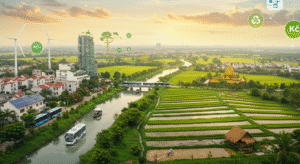A key pillar of this transformation is improving the effectiveness of policy implementation across various sectors. This includes financial management, environmental protection, digital transformation, social welfare, and the development of low-carbon infrastructure. Institutional reforms are essential to ensure that economic growth is not only fast but also inclusive and sustainable. Environmental commitments play a central role in Vietnam’s development strategy. At the COP27 climate summit, the country pledged to reduce methane emissions by 30%, end deforestation by 2030, and reach net-zero carbon emissions by 2050. These targets reflect Vietnam’s recognition that economic progress must go hand in hand with environmental stewardship. The World Bank has been a long-standing development partner to Vietnam, contributing over $24 billion across 180 projects and programs in the past 25 years. Continued international support will be critical as Vietnam navigates complex economic and environmental challenges. In summary, with a sustained focus on reform and green development, Vietnam has a viable path to achieving high-income status. The country’s future will depend on how effectively it implements policies that foster both economic growth and environmental sustainability. Source: World Bank |

 Vietnam is well-positioned to become a high-income country by 2045, according to a recent World Bank press release dated May 22, 2025. Achieving this ambitious goal will require the country to sustain strong institutional reforms and accelerate its transition to greener development practices. The World Bank emphasizes that to reach high-income status within two decades, Vietnam must maintain an average annual per capita economic growth rate of about 6%.
Vietnam is well-positioned to become a high-income country by 2045, according to a recent World Bank press release dated May 22, 2025. Achieving this ambitious goal will require the country to sustain strong institutional reforms and accelerate its transition to greener development practices. The World Bank emphasizes that to reach high-income status within two decades, Vietnam must maintain an average annual per capita economic growth rate of about 6%.